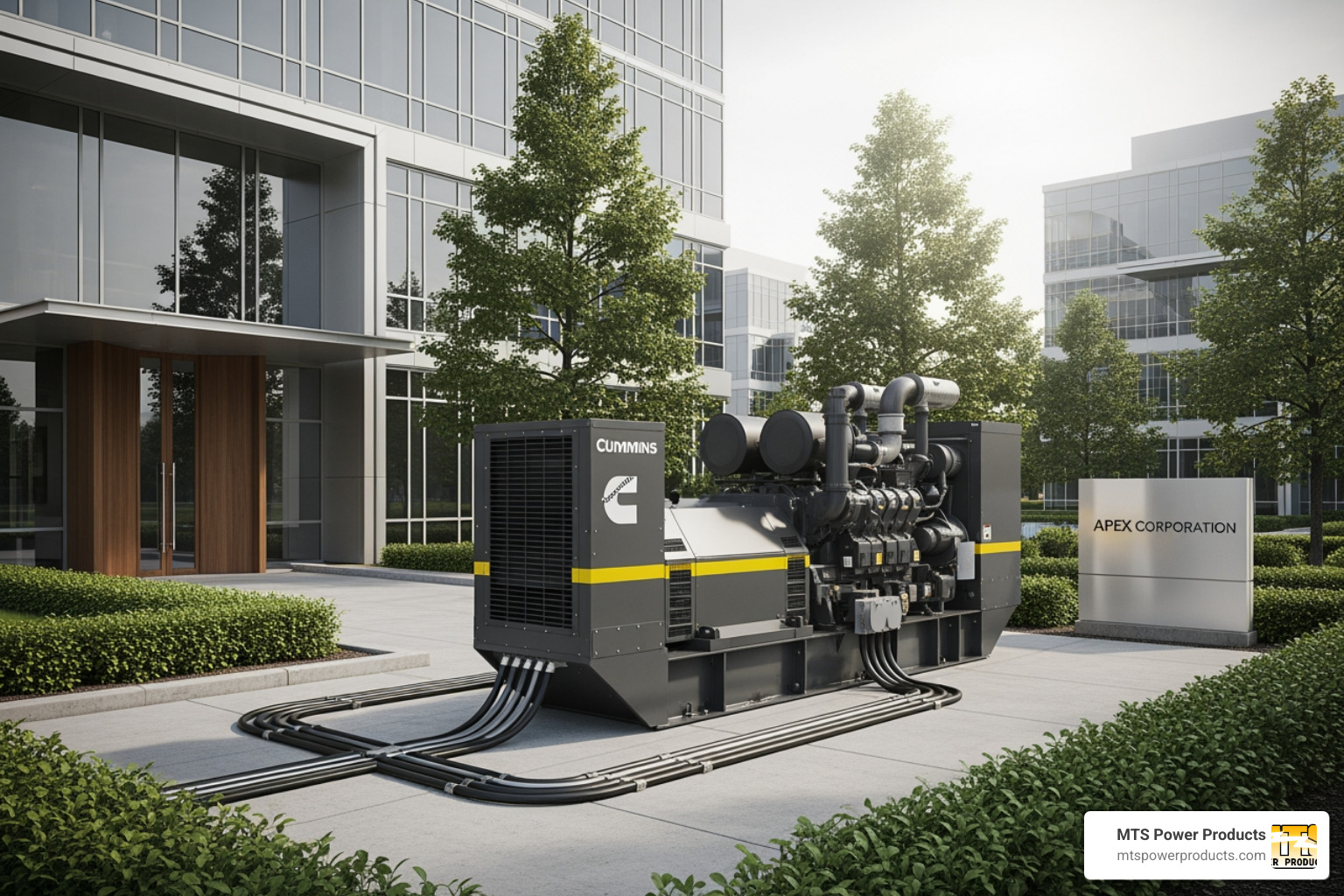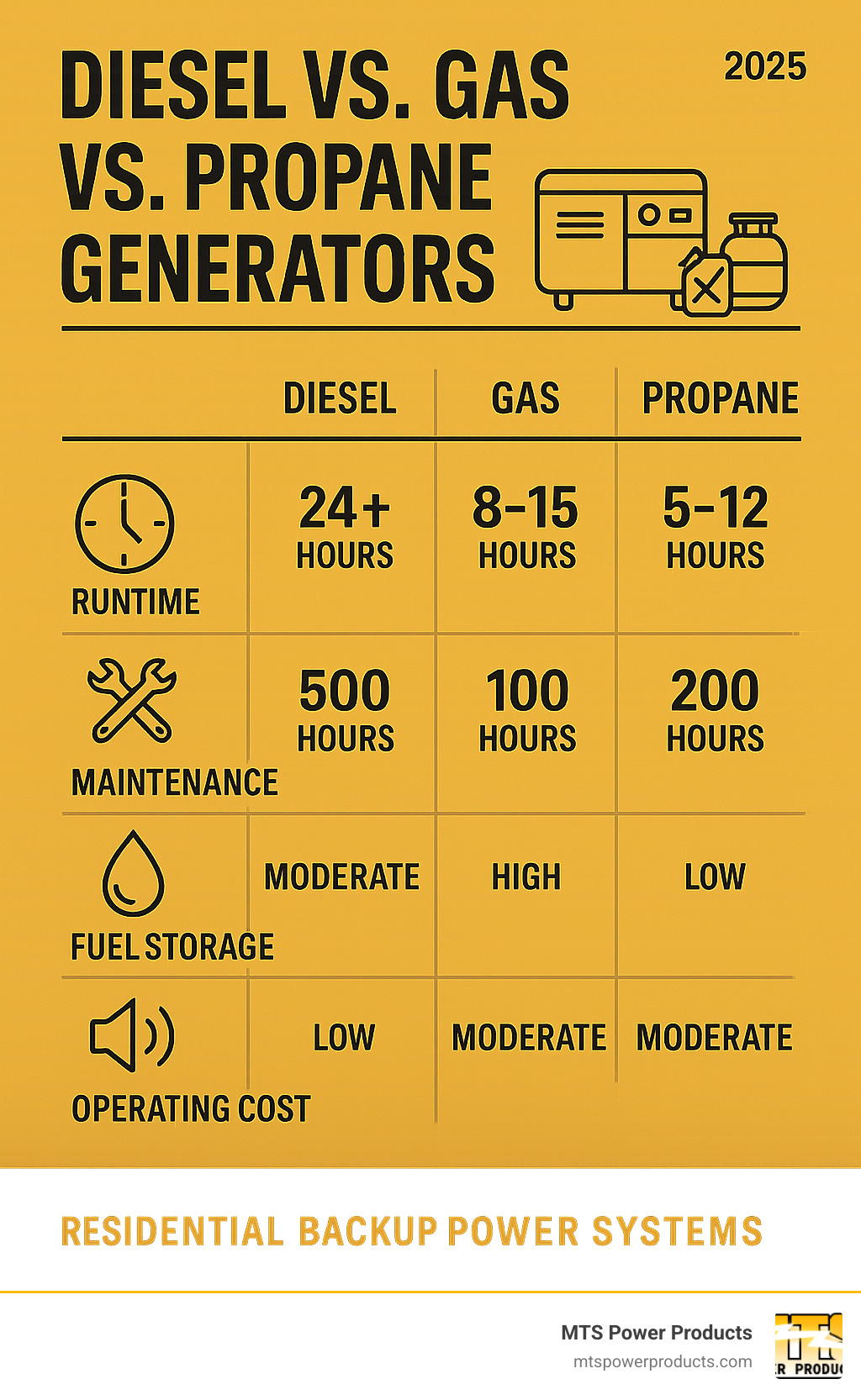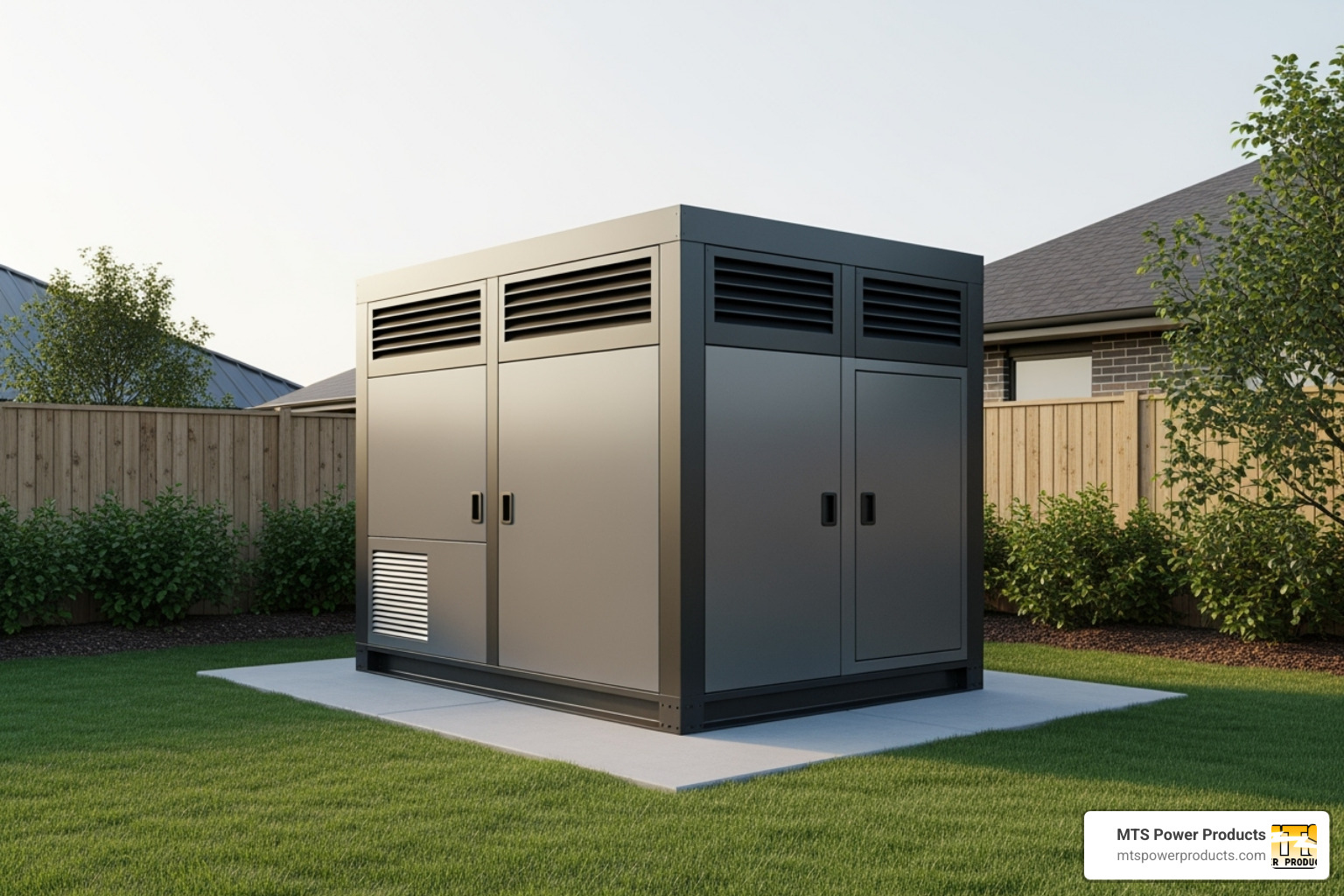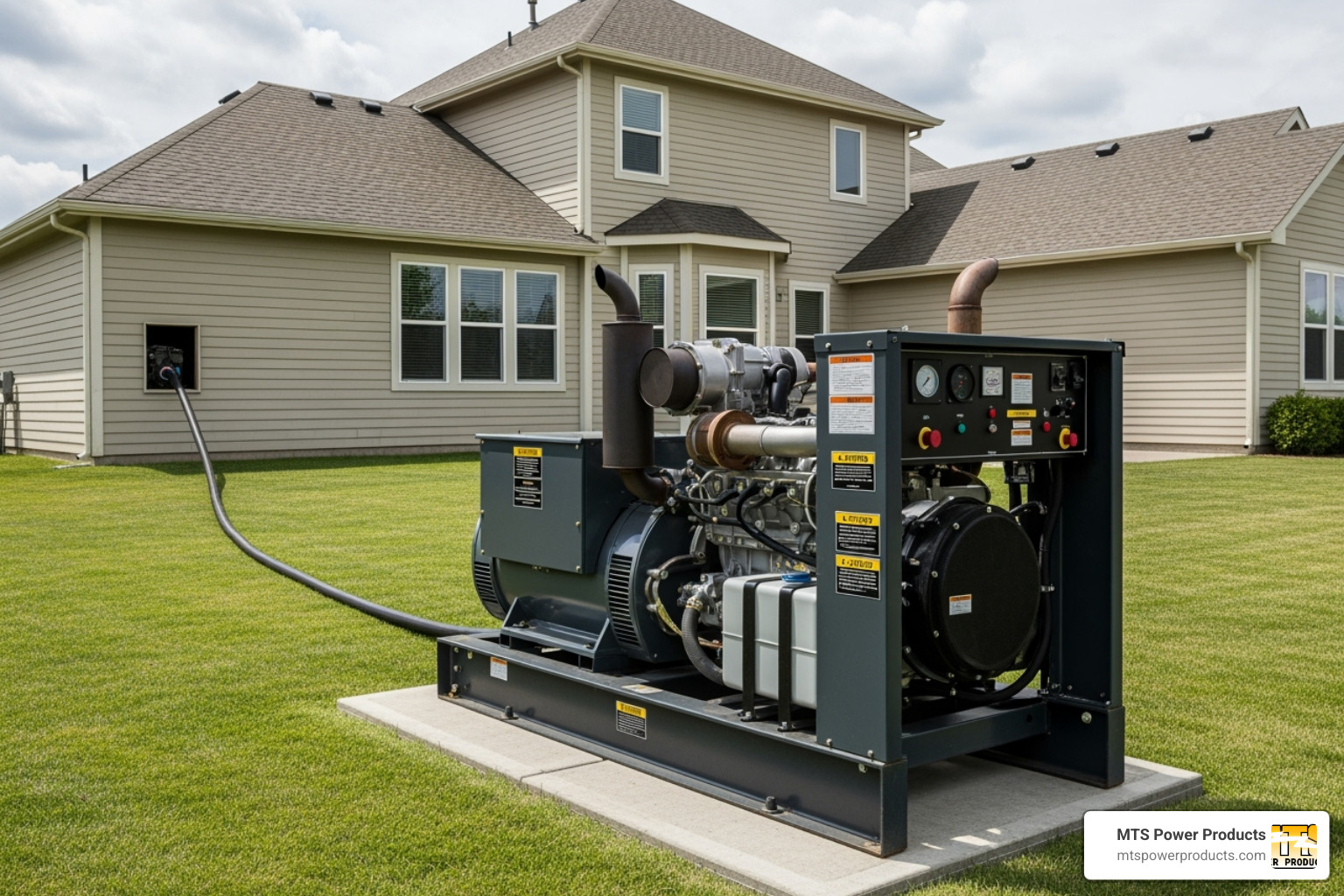
Buy Direct
from the Manufacturer
Sell our Products
Become a Distributor
Discounts
on volume purchases
Visit Us
at our Miami office
from the Manufacturer
Become a Distributor
on volume purchases
at our Miami office
When you need a diesel generator for home backup power, you’re making a smart choice for long-term reliability and performance. Diesel generators offer superior fuel efficiency, extended runtime capabilities, and significantly lower maintenance requirements compared to gas or propane alternatives.
Quick Comparison: Why Choose Diesel for Home Backup Power
The Northeast blackout of 2003 affected over 55 million people for almost a week. Hurricane Hugo left many families without power for weeks. These real-world events highlight why more homeowners are investing in reliable backup power solutions.
Modern diesel generators have evolved far beyond their industrial roots. Today’s home diesel generators feature sound-attenuated enclosures that operate at 65dB or lower – about as quiet as normal conversation. They automatically start during outages, seamlessly powering your essential systems until utility power returns.
Whether you’re protecting your family during hurricane season in South Florida or ensuring year-round power security, a diesel generator provides the reliability and peace of mind you need when the grid fails.

Diesel generator for home basics:
When choosing backup power, fuel type is critical. A diesel generator for home is often the smartest choice for long-term reliability and peace of mind.
Diesel’s primary advantage is fuel efficiency. Diesel engines extract more energy per gallon, meaning longer runtimes on less fuel. During a prolonged outage, these savings add up, making it an investment in lower long-term operating costs.
A quality diesel generator for home can last 20 to 30 times longer than other generator types, providing decades of reliable service. You’ll likely still be running your diesel unit long after others have been replaced multiple times.
Diesel generators also simplify maintenance. They require oil changes only every 500 hours, compared to every 100 hours for gas units. This means five times less maintenance. Built for continuous, heavy-duty operation, diesel engines are far more robust than other engine types.
The reliability of diesel is best. These generators can run continuously for weeks—up to three weeks in some cases—without a break. During extended outages like those after Hurricane Hugo, a diesel generator provides uninterrupted power.
Fuel storage safety is another crucial benefit. Diesel is much less flammable than gasoline, making it safer to store on your property. It also has a longer shelf life, so you don’t have to worry about fuel degrading in your tank.
For more information on diesel options, visit our Diesel Generator page.
A key difference setting diesel generators apart is engine speed. Most gas generators run at 3600 RPM, while diesel generators operate at a more relaxed 1800 RPM. This lower operating speed is the foundation for their benefits. Less engine stress means fewer breakdowns, a longer lifespan, and quieter operation, as slower-turning parts last longer and require less maintenance.
The power density of diesel fuel is another game-changer. Diesel packs more energy per gallon, which translates directly into better performance and efficiency. Combined with the engine’s design, you get maximum power with minimum fuel consumption.
During disasters, fuel availability is a major concern. Natural gas lines can be damaged and propane deliveries may stop, but diesel can be stored safely on-site, ensuring you aren’t dependent on failing infrastructure.
Here’s how diesel generator technology stacks up:
| Feature | Diesel Generator Benefits |
|---|---|
| Fuel Efficiency | Excellent energy extraction per gallon, leading to lower running costs |
| Lifespan | 20-30 times longer than other generator types due to robust, lower-RPM design |
| Maintenance Interval | Oil changes every 500 hours vs. 100 hours for gas units |
| Run Time | Continuous operation for up to 3 weeks during extended outages |
| Fuel Storage Safety | Less flammable than gasoline, longer shelf life without degradation |
| Operating Cost | Lower overall costs due to efficiency and extended maintenance intervals |
Forget the image of a loud, clattering engine. Modern diesel generator for home units are surprisingly quiet.

The 1800 RPM operation is a primary reason for their quietness. Half the engine speed means significantly less noise and vibration compared to high-revving 3600 RPM gas units.
Today’s residential diesel generators also feature advanced sound attenuation technology. Sound-insulated enclosures create a barrier that contains noise within the generator housing. Residential-grade mufflers and vibration mounts further reduce noise, resulting in levels of 65dB or lower—about as loud as a normal conversation.
The enclosure design is engineered to absorb and redirect noise away from your home. When you invest in a quality Home Generator from a reputable manufacturer, you get technology that keeps your family comfortable without disturbing the peace.
Choosing the right size diesel generator for home is crucial. You need a unit that can handle your essential needs during an outage without paying for capacity you’ll never use.

Your home’s power needs are unique, depending on its size and what you want to power. Will you need whole-house power to keep everything running normally, or just enough for essential appliances like the refrigerator and a few lights?
Modern diesel generators for home use typically come in kW ratings from 10kW for smaller homes to 15kW and 20kW+ for larger properties. Many feature intelligent load management systems that automatically prioritize power to your most critical systems, ensuring the important things keep working even if the generator is pushed to its limits.
For detailed guidance on making the right choice, check out our comprehensive guide on Choosing the Best Home Backup Generator.
Correctly sizing your generator means identifying which appliances and systems are critical during an outage. While square footage is a factor, the specific appliances you need to run are more important.
Your HVAC systems are often the largest power consumers. In South Florida, keeping the air conditioning running during a summer outage is a matter of safety. These systems can require 3-5kW or more.
Also consider the basics: refrigerators and freezers to prevent food spoilage, a well pump for water, and sump pumps during storm season.
Medical equipment like CPAP machines or oxygen concentrators requires special attention, as these devices need guaranteed power.
The best approach is getting a professional assessment. We can calculate both starting and running watts to ensure your generator can handle power surges without shutting down.
For specific guidance on diesel options, visit our page dedicated to Choosing a Diesel Home Generator.
Understanding the full investment is key to proper planning. The initial purchase price of a diesel generator for home is the starting point. Quality whole-house generators typically start around $3,957 for a 13kW model and $5,438 for a 20kW unit.
The generator itself is only part of the total investment. Installation costs are significant and necessary. Professional installation, which is required for safety and to meet local building codes, includes electrical work, fuel line connections, and often a concrete pad.
The Automatic Transfer Switch (ATS) is the brain of the system, detecting outages and seamlessly switching your home to generator power.
Fuel tanks are another consideration. While some units have integrated tanks, larger systems may need additional fuel storage for extended runtimes. We offer options like subbase fuel tanks and fuel drum kits.
Accessories like cold weather kits ensure reliable starting in harsh winters, while load management kits optimize power distribution and prevent overloads.
Regarding long-term fuel costs, diesel’s superior efficiency means lower operating expenses. Combined with the longevity of diesel engines, your upfront investment pays dividends for decades, providing long-term peace of mind.
For a complete breakdown of what to expect financially, explore our guide on Buying a Backup House Generator.
A modern diesel generator for home represents impressive engineering. Today’s units are not just powerful—they’re smart, durable, and sophisticated, showcasing major advances in generator technology.

The core of a quality diesel generator for home is its durability. Built to withstand the elements, most feature weather-protective enclosures made from corrosion-resistant aluminum, which is crucial in salt-air environments like South Florida. This robust construction ensures your generator will run reliably for decades.
Beyond durability, modern generators are packed with advanced technology for convenience. Many units feature remote monitoring apps, allowing you to check your generator’s status from anywhere. Programmable displays offer comprehensive information on status, fuel levels, and maintenance needs. Some even include intelligent load management to prioritize power to essential appliances.
Features like automatic weekly self-testing ensure your generator is always ready, running through its checks without any manual intervention.
For more details on the robust power solutions available, check out our Diesel Engine Generator offerings.
An automatic standby generator is, as its name implies, fully automatic. Once installed, your diesel generator for home constantly monitors your home’s power and is ready to activate instantly when an outage occurs.
The Automatic Transfer Switch (ATS) is the brain of the system. This device monitors the utility’s electrical supply 24/7. When a power outage occurs, the ATS immediately disconnects your home from the grid to prevent dangerous back-feeding. It then signals the generator to start.
Your diesel generator for home starts and stabilizes, and the ATS seamlessly transfers your home’s electrical load to the generator. The entire process usually takes less than 30 seconds.
When utility power returns, the ATS detects it and switches your home back to the grid. The generator then runs a brief cool-down cycle before shutting down and returning to standby mode. Many units include Quiet-Test modes that perform weekly self-checks at reduced RPMs to minimize noise.
This hands-free operation provides reliable backup power without any hassle during a storm. To learn more, visit our Automatic Generator for a Home page and explore our Residential Standby Generator options.
Diesel generators are remarkably low-maintenance compared to other backup power systems. While they require regular care, their maintenance schedule is far more forgiving than that of gas or propane units.
The biggest advantage is the extended maintenance intervals. A diesel generator for home typically needs oil and filter changes only every 500 hours of operation, compared to every 100 hours for gas generators. This means less upkeep for busy homeowners.
Beyond oil changes, other key areas need attention. The air filter should be inspected and cleaned regularly for engine efficiency. The fuel system requires periodic inspection for leaks and clean filters. Coolant levels in liquid-cooled models and the starter battery charge should also be monitored.
Regularly checking the control panel for error codes or maintenance alerts is also important. Proper maintenance protects your investment, ensuring your diesel generator for home runs reliably for decades and is ready for the next storm.
For more insights on why this investment makes sense, see our article on Reasons to Invest in a Standby Generator for Home Use.
Generator safety is paramount. A properly installed and maintained diesel generator for home is incredibly safe, but this requires professional installation and adherence to important guidelines.
Professional installation is essential. Certified installers understand local codes and permit requirements, ensuring your generator meets all safety standards for electrical connections, fuel lines, and placement.
Proper ventilation is critical. Generators produce carbon monoxide, so they must be installed outdoors in a well-ventilated area, away from windows, doors, and air intakes.
Diesel fuel is safer to store than gasoline because it is less flammable, but it still requires proper handling in approved containers away from ignition sources. Modern generators also include automatic safety shutdowns for conditions like low oil pressure or high engine temperature.
Environmentally, today’s diesel generators are much cleaner than older models. Clean diesel technology has advanced significantly due to strict emissions standards, making them more responsible choices for residential use.
A California Proposition 65 warning on documentation is a standard consumer notice and does not mean the product is unsafe when used as intended. More information is available at P65Warnings.ca.gov.
Following safety guidelines and choosing modern clean diesel technology ensures reliable backup power with complete peace of mind.
When you’re considering a diesel generator for home backup power, you probably have some burning questions. We get these questions all the time from homeowners who want to make sure they’re making the right choice for their families. Let’s tackle the most common ones.
This is where diesel really shines, and it’s one of the biggest reasons we recommend Diesel Standby Generators for serious backup power needs. With proper maintenance and an adequate fuel supply, your diesel generator can run non-stop for days or even weeks. Some models are actually rated for up to 3 weeks of continuous operation without needing a break.
Think about that for a moment – three weeks! While other generator types typically need frequent shutdowns for maintenance or cooling, your diesel unit just keeps chugging along. This makes them absolutely ideal for those prolonged outages we sometimes see after major hurricanes or severe weather events.
The secret lies in that robust diesel engine design we talked about earlier. Since these engines operate at lower RPMs and are built for heavy-duty, continuous operation, they can handle the marathon while other generators are built more for sprints.
Ah, the million-dollar question! A 10kW generator can typically handle your essential appliances like refrigerators, lights, a sump pump, and some electronics without breaking a sweat. But whether it can run your entire house? Well, that depends on a few key factors.
Your home’s size matters, but more importantly, it’s about what you want to run during an outage. If you’re hoping to keep that central air conditioning humming during a summer blackout, a 10kW unit might struggle. Large HVAC systems are power-hungry beasts that can easily overwhelm a smaller generator.
For larger homes or those with high-demand appliances, you’ll likely need to step up to a 20kW diesel generator or more. The good news? Getting the right size isn’t guesswork. A professional load calculation takes all the mystery out of it, ensuring you get exactly what you need without paying for excess capacity you’ll never use. Check out our Emergency Home Generators to see the range of options available.
There are several compelling reasons why diesel fuel is superior for home backup power, and they all come down to safety, efficiency, and durability.
First, let’s talk safety. Diesel is less flammable than gasoline, making it much safer to store on your property. You won’t have the same fire hazards or vapor concerns that come with gasoline storage. Plus, diesel has a longer shelf life, so you don’t have to worry about fuel going bad as quickly.
Then there’s the efficiency factor. Diesel engines are incredibly fuel-efficient, meaning you get more power per gallon compared to other fuel types. This translates directly into lower operating costs during those extended outages.
But here’s where it gets really interesting – diesel engines are specifically designed for high torque and low-speed operation at 1800 RPM. Compare that to gasoline generators that typically scream along at 3600 RPM. That lower operating speed means significantly less wear and tear on engine components, resulting in a much longer lifespan and quieter operation.
This combination of safety, efficiency, and durability is exactly why a diesel generator for home use makes so much sense for families who want reliable, long-term backup power without the constant maintenance headaches.
When you’re ready to invest in a diesel generator for home backup power, you’re making a decision that will protect your family for decades to come. The superior fuel efficiency, exceptional longevity, and rock-solid performance of diesel technology isn’t just marketing speak—it’s a reality that translates into genuine peace of mind when the lights go out.
We’re MTS Power Products, and we’ve been right here in Miami, Florida, helping families secure their homes against power outages. As a manufacturer and provider of generator sets, we offer something most companies can’t: direct access to professional-quality generators without the middleman markup. When you work with us, you’re getting factory-direct pricing and expertise.
What sets us apart isn’t just our location—though being minutes from Miami International Airport and the Port of Miami certainly helps with worldwide delivery. It’s our commitment to innovation and safety. Our own customized line, McPherson Controls, represents years of engineering focused on one goal: giving you better control over your power systems.
We don’t just sell you a generator and wave goodbye. Every diesel generator for home solution we provide includes advanced features like remote monitoring capabilities, so you can check on your system from anywhere. Our high safety standards aren’t negotiable—we integrate programmable displays and switch mechanisms that give you improved control while keeping your family safe.
Whether you need a custom generator setup, an automatic transfer switch, or specialized power controls, there’s simply no better company in South Florida to handle your needs. We’re not just selling equipment; we’re delivering complete power solutions custom specifically to your home and lifestyle.
Ready to explore your options? Check out our complete range of diesel-powered generators and find why so many South Florida families trust us to keep their lights on when it matters most. Let’s work together to achieve the ultimate power security for your home.